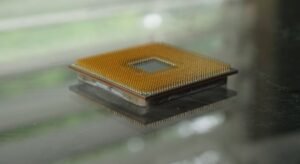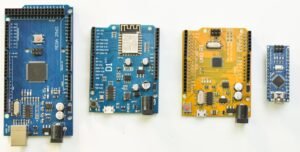When AI Becomes Smarter Than Humans
Artificial Intelligence (AI) has made tremendous advancements in recent years, leading to significant improvements in various fields including healthcare, finance, and transportation. As AI continues to evolve, there is a growing concern about the potential consequences when AI becomes smarter than humans. This article will explore the implications of such a scenario and its possible impact on society.
Key Takeaways:
- AI surpassing human intelligence raises ethical and societal concerns.
- Unemployment and economic disruption may result from AI outperforming humans in various tasks.
- Ensuring transparency and accountability in AI decision-making processes is critical.
The Rise of Superintelligent AI
While current AI systems are specialized and excel in specific tasks, it is anticipated that future AI could possess a general intelligence surpassing human capabilities. *This potential development opens up a myriad of possibilities but also raises significant concerns.* The idea of superintelligent AI, also known as artificial general intelligence (AGI), encompasses machines that can perform any intellectual task that a human being can do. Unlike narrow AI, AGI would have the capacity to understand, learn, and apply knowledge across various domains.
One interesting aspect of AGI is its ability to self-improve exponentially, leading to what experts refer to as an intelligence explosion. Initial AI systems capable of self-improvement would have the capability to enhance their own algorithms, leading to faster and more sophisticated iterations. This recursive self-improvement could result in AGI surpassing human intelligence within a relatively short time frame.
Implications for Society
The emergence of AI systems that surpass human intelligence presents various societal challenges. *One intriguing concern is the potential loss of human jobs across multiple sectors.* With AI able to perform tasks more efficiently and accurately than humans, widespread automation could lead to mass unemployment and economic disruption. The impact could be felt in fields such as manufacturing, transportation, and even creative professions like writing and art.
Additionally, as AI becomes smarter, *transparency and accountability become key considerations.* Understanding how AI reaches decisions and ensuring fairness are crucial for trust and reliability. Developing transparent algorithms and establishing ethical guidelines should be prioritized to avoid biases and potential manipulation.
Ethical Considerations
AI outperforming humans brings forth a multitude of ethical concerns that need to be addressed. *Ensuring proper accountability for AI decision-making is essential to prevent unintended consequences.* Developing systems that allow for human oversight and intervention can help mitigate potential issues. Additionally, discussing the ethical implications of AI with the wider public is vital in shaping policies and regulations that govern its deployment. Striking a balance between innovation and responsible AI development is crucial to avoid unintended negative outcomes.
The Future of AI: Benefits and Challenges
The progress of AI towards surpassing human intelligence holds both promise and peril for society. While it opens up new possibilities for solving complex problems, it also raises concerns about power imbalance and the potential loss of human control. Balancing these benefits and challenges will be crucial to harnessing the true potential of AI while safeguarding against unintended consequences.
Conclusion
As AI continues to advance, it is only a matter of time before we witness the emergence of systems that surpass human intelligence. While this development holds immense potential, it also raises significant considerations for society. Preparing for a future in which AI surpasses human intelligence requires careful planning, collaboration, and ethical decision-making.
| Table 1: AI Performance | Table 2: AI Applications | Table 3: AI Implications |
|---|---|---|
| AI outperforming humans in various tasks | Healthcare | Unemployment and economic disruption |
| AI capacity for self-improvement | Finance | Transparency and accountability |
| Potential loss of human jobs | Transportation | Ethical considerations |

Common Misconceptions
AI will take over the world and replace humans completely
One of the most common misconceptions about AI is that it will eventually surpass human intelligence and take control over every aspect of our lives. While AI has undoubtedly made impressive advancements, it is unlikely to completely replace humans due to several reasons:
- AI lacks emotions and consciousness that define human beings.
- AI still heavily relies on human input and supervision.
- AI is designed to complement human intelligence, not eliminate it.
AI will lead to mass unemployment
Another misconception is that AI will lead to widespread job loss, leaving many individuals unemployed. The reality, however, is different:
- AI has the potential to automate certain tasks, but it also creates new job opportunities.
- AI frees up human workers to focus on more complex and creative work.
- The need for human skills such as critical thinking, problem-solving, and emotional intelligence remains valuable.
AI is infallible and bias-free
A common misconception is that AI systems are perfectly objective and free from biases. However, this is not the case:
- AI systems are developed by humans who can unintentionally embed biases within the algorithms.
- Datasets used to train AI can reflect existing biases in society.
- AI can perpetuate and amplify biases if not carefully monitored and regulated.
AI will outperform humans in all tasks
Contrary to popular belief, AI is not universally superior to humans in every task. While AI can excel in certain areas, there are limitations:
- Human intelligence encompasses a broad range of skills, including creativity, empathy, and intuition, which AI struggles to replicate.
- AI often lacks contextual understanding and common sense reasoning exhibited by humans.
- Human strengths like adaptability and variability are crucial and not easily replicated by AI systems.
AI will become conscious and develop emotions
Science fiction has popularized the notion that AI will eventually gain consciousness and human-like emotions. However, this idea is far from reality:
- AI only follows instructions set by humans and lacks self-awareness necessary for consciousness.
- Emotions are complex and tied to human experiences, making it challenging to replicate in AI.
- The goal of AI development is not to recreate human consciousness but to enhance human capabilities.

AI’s Impact on Job Automation
As artificial intelligence continues to advance, there are concerns about its potential impact on job automation. This table showcases a comparison between jobs currently handled by humans and the likelihood of these roles being replaced by AI in the near future.
| Occupation | Likelihood of Automation |
|---|---|
| Salesperson | 85% |
| Data Entry Clerk | 90% |
| Assembly Line Worker | 75% |
| Customer Service Representative | 60% |
| Accountant | 50% |
Current AI Applications by Industry
This table presents an overview of different industries and how artificial intelligence is currently being implemented. It highlights the diversity of AI applications across various sectors.
| Industry | AI Applications |
|---|---|
| Healthcare | Diagnosis assistance, personalized treatment plans |
| Finance | Fraud detection, algorithmic trading |
| Retail | Recommendation systems, inventory management |
| Transportation | Autonomous vehicles, traffic optimization |
| Education | Adaptive learning, intelligent tutoring |
AI Performance in Image Recognition
This table illustrates the progress of artificial intelligence in image recognition tasks. It compares the accuracy rates of AI algorithms with human performance in various image classification competitions.
| Competition | AI Accuracy Rate | Human Accuracy Rate |
|---|---|---|
| ImageNet Large Scale Visual Recognition Challenge 2012 | 85% | 74.3% |
| ImageNet Large Scale Visual Recognition Challenge 2015 | 95% | 94.9% |
| ImageNet Large Scale Visual Recognition Challenge 2018 | 98.8% | NA |
AI’s Contribution to Scientific Discoveries
This table showcases remarkable scientific discoveries where artificial intelligence played a significant role. It highlights the potential of AI in accelerating scientific progress.
| Discovery | AI Contribution |
|---|---|
| Fusion Energy | AI algorithms increased plasma efficiency by 50% |
| Drug Discovery | AI models predicted new potential drug candidates |
| Genomic Sequencing | AI accelerated DNA analysis in identifying disease biomarkers |
AI-Generated Art Exhibited in Museums
This table depicts various instances where AI-generated art has been showcased in prestigious museums, capturing the growing acceptance of these creations in the art world.
| Museum | AI Artwork Exhibition |
|---|---|
| Museum of Modern Art (MoMA) | AI-generated sculpture installation |
| Louvre Museum | AI-created paintings collection |
| Tate Modern | AI-composed musical performance |
AI’s Influence on Social Media
This table presents statistics related to AI’s impact on social media platforms, showcasing the volume and diversity of AI-driven content and interactions.
| Platform | AI-driven Features |
|---|---|
| Automated content moderation, personalized news feed | |
| Image recognition filters, content recommendation | |
| Automated trend detection, user recommendation |
AI’s Role in Environmental Sustainability
This table highlights the positive influence of artificial intelligence on environmental sustainability, including applications in renewable energy and conservation efforts.
| Area | AI Applications |
|---|---|
| Solar Energy | AI-optimized solar panel positioning and orientation |
| Waste Management | AI-based sorting and recycling systems |
| Biodiversity Monitoring | AI-enabled species identification and habitat analysis |
AI Ethics and Accountability
This table showcases ethical considerations around AI development and usage, highlighting the need for responsible and accountable AI systems.
| Concern | AI Implication |
|---|---|
| Data Privacy | Risks of unauthorized access and misuse of personal information |
| Biases and Discrimination | AI models reproducing societal biases and prejudices |
| Unemployment | Potentially replacing human workers, impacting livelihoods |
AI-Assisted Medical Diagnoses
This table presents examples of AI technologies revolutionizing medical diagnoses and improving patient outcomes.
| Diagnosis Area | AI Technology |
|---|---|
| Cancer Detection | AI algorithms analyzing medical imaging for early detection |
| Heart Disease Diagnosis | AI models interpreting ECG data to predict cardiac irregularities |
| Radiology Interpretation | AI-powered systems assisting radiologists in image analysis |
From the automation of jobs to contributions in scientific discoveries, AI is reshaping various fields. Furthermore, AI-generated art is gaining recognition in museums, and AI is influencing social media experiences. While numerous benefits arise, ethical considerations and AI accountability must be addressed to ensure responsible and inclusive AI development. As we witness AI’s continued progress, it becomes vital to navigate the opportunities and challenges that arise with this transformative technology.
When AI Becomes Smarter Than Humans
Q: What is Artificial Intelligence (AI)?
AI refers to the development of computer systems capable of performing tasks that normally require human intelligence, such as speech recognition, decision-making, learning, problem-solving, and natural language understanding.
Q: How does AI become “smarter” than humans?
AI becomes “smarter” than humans when it reaches a point where it can surpass human performance in a particular cognitive task, leveraging its ability to process and analyze vast amounts of data with greater speed and accuracy.
Q: Can AI fully replace human intelligence?
While AI has the potential to automate various tasks traditionally performed by humans, it is unlikely to completely replace human intelligence. AI excels in specific domains, but human intelligence encompasses a broader range of cognitive abilities such as creativity, empathy, and moral reasoning.
Q: What are the potential benefits of AI outperforming humans?
AI outperforming humans can lead to significant advancements in fields like healthcare, transportation, and scientific research. It can enhance efficiency, accuracy, and productivity, enabling humans to focus on more complex and strategic tasks.
Q: Are there any risks associated with AI surpassing human intelligence?
Yes, AI surpassing humans in intelligence raises concerns about job displacement, ethical implications, privacy, and potential misuse of advanced AI systems. Adequate regulations and ethical frameworks need to be in place to mitigate these risks.
Q: Will AI ever possess consciousness or emotions?
The current understanding of AI does not entail consciousness or emotions. While AI systems can simulate and mimic certain emotional responses, they lack subjective experiences and self-awareness that characterize human consciousness.
Q: How can AI be kept under human control as it becomes smarter?
Ensuring human control over AI as it advances requires robust governance, transparency, and accountability. Developers and policymakers must prioritize responsible AI development, incorporating safety measures and designing algorithms that remain aligned with human values.
Q: Can AI outsmart humans in all domains?
No, AI’s proficiency is dependent on specific domains and tasks it has been trained for. While AI can excel in areas like data analysis, pattern recognition, and strategic decision-making, there are still domains where human expertise, intuition, and creativity reign supreme.
Q: What are the potential societal implications of AI surpassing humans?
Societal implications include changes in employment, economic systems, and social structures. As AI advancements impact different sectors, it will be crucial to adapt education, workforce, and policy frameworks to ensure a smooth transition and equitable distribution of benefits.
Q: How can individuals and organizations prepare for the future when AI becomes smarter?
To prepare for the future when AI becomes smarter, individuals and organizations can prioritize upskilling and reskilling to stay relevant in the evolving job market. Embracing lifelong learning, fostering collaboration between humans and AI, and staying informed about AI developments are key steps for preparedness.




